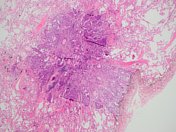Items tagged “prostate”
70 results found
Case
Lung metastasis - from prostate acinar adenocarcinoma

Published
01 Apr 2016
91% complete
Pathology
Case
Prostate cancer with bone and lymph nodes metastases

Published
13 May 2016
80% complete
MRI
Article
Chronic prostatitis
Chronic prostatitis is a heterogeneous condition characterized by chronic inflammation of the prostate gland.
Under the National Institutes of Health (NIH) classification system this may encompass
chronic bacterial prostatitis
chronic prostatitis and chronic pelvic pain syndrome (CPPS)
Other...
Article
Prostatic tuberculosis
Prostatic tuberculosis or tuberculous prostatitis is an uncommon extrapulmonary manifestation of Mycobacterium tuberculosis infection. This is sometimes classified a sub type of granulomatous prostatitis.
Epidemiology
Primary tuberculosis of the prostate is rare. Genitourinary tuberculosis con...
Article
PSA density
The PSA density (PSAD) is a calculation performed at diagnosis and is the serum prostate specific antigen (PSA) level (ng/mL) divided by the volume of the prostate gland (mL), resulting in a value with the units, ng/mL2 1. Prostate volume is calculated from TRUS measurements 2,3.
Alternatively...
Article
Brachytherapy seed migration to the lung
Brachytherapy seed migration to the lung is a known complication of radioactive seed therapy. These seeds are used for localized treatment of malignancies, most commonly prostate cancer.
Regarding staging, nearly 79% of the cases are localized, 12% are regional and 5% present with distant disea...
Case
Prostate-seminal vesicle angle (TRUS)

Published
12 May 2020
60% complete
Annotated image
Article
Leiomyosarcoma of the prostate
Leiomyosarcoma of the prostate is a rare mesenchymal smooth muscle malignancy of the prostate gland.
Epidemiology
It is a rare tumor with less than 200 cases reported in the literature accounting for approximately 25% of all sarcomas of the prostate gland and less than 0.1% of primary prostate...
Article
Sarcomatoid carcinoma of the prostate
Sarcomatoid carcinoma of the prostate is a rare malignant prostatic tumor variant usually composed of both malignant glandular cells and spindle cells.
Terminology
Sarcomatoid carcinoma of the prostate is also known as carcinosarcoma, metaplastic carcinoma or spindle cell carcinoma of the pros...
Case
Locally invasive prostate cancer

Published
25 Jan 2021
89% complete
CT
Article
Prostate imaging recurrence reporting
Prostate imaging recurrence reporting (PI-RR) or prostate MRI for local recurrence reporting is a structured reporting scheme similar to the Prostate Imaging-Reporting and Data System (PIRADS) v2.1 on multiparametric prostate MRI for the detection of local recurrence after radical prostatectomy ...
Article
Small cell carcinoma of the prostate
Small cell carcinomas of the prostate (SCCP) or small cell neuroendocrine carcinomas of the prostate are neuroendocrine tumors and are characterized by aggressive behavior and a proliferation of small cells.
Epidemiology
Small cell neuroendocrine carcinomas of the prostate are rare 1,2 and mak...
Article
Large cell neuroendocrine carcinomas of the prostate
Large cell neuroendocrine carcinomas (LCNEC) of the prostate or prostatic large cell neuroendocrine carcinomas are very aggressive and rare high-grade neuroendocrine tumors that are usually observed in the presence of an already existing adenocarcinoma and very rarely found alone.
Epidemiology
...
Article
Well-differentiated neuroendocrine tumor of the prostate
Well-differentiated neuroendocrine tumors of the prostate also known as low-grade neuroendocrine carcinoma of the prostate or carcinoid tumors of the prostate are low-grade neuroendocrine tumors arising from the prostate that may metastasize.
Epidemiology
Well-differentiated neuroendocrine tum...
Article
Adenocarcinoma of the prostate with neuroendocrine differentiation
Adenocarcinoma of the prostate with neuroendocrine differentiation is a malignant neuroendocrine tumor of the prostate which only differs from acinar or ductal adenocarcinoma on immunohistochemistry staining.
Diagnosis
The diagnosis of adenocarcinoma of the prostate with neuroendocrine differe...
Article
Ductal adenocarcinoma of the prostate
Ductal adenocarcinomas of the prostate or prostatic ductal adenocarcinomas are malignant glandular neoplasms of the prostate and tend to be more aggressive than acinar adenocarcinomas.
Terminology
Due to its morphologic resemblance, it has been formerly referred to as 'endometrial' or 'endomet...
Article
Intraductal carcinoma of the prostate
Intraductal carcinomas of the prostate (IDCP) are a new subtype of prostate cancer that has been included as a new entity in the WHO classification of prostate tumors in 2016.
Epidemiology
Intraductal carcinomas of the prostate are rarely found isolated on needle core biopsy samples in 0.1-0.3...
Article
High-grade prostatic intraepithelial neoplasia
High-grade prostatic intraepithelial neoplasia (HGPIN) refers to a proliferation of glandular epithelial cells and is generally considered a nonobligatory precursor lesion of invasive prostate cancer.
Epidemiology
High-grade prostatic intraepithelial neoplasia is diagnosed in core needle biops...
Article
Urothelial carcinoma of the prostate
Urothelial carcinomas or transitional cell carcinomas of the prostate are malignant neoplasms that can occur as primary cancers of the prostate gland.
Epidemiology
Prostatic urothelial carcinomas account for less than 2-4% of all prostate cancers 1 and are usually seen in middle-aged men 2.
A...
Article
Squamous neoplasms of the prostate
Squamous neoplasms of the prostate include squamous cell carcinomas and adenosquamous carcinomas of the prostate that account for two separate entities in the WHO classification of prostate tumors.
Epidemiology
Squamous cell carcinomas of the prostate are very rare and encompass <1% of prostat...







 Unable to process the form. Check for errors and try again.
Unable to process the form. Check for errors and try again.